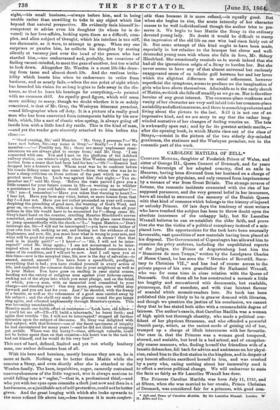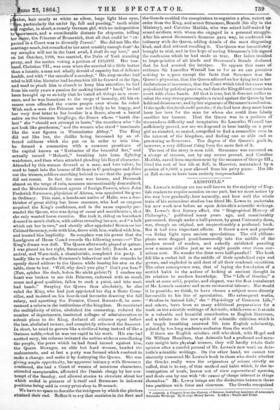CAROLINE MATILDA OF ZELL.*
Cortorawz MATILDA, daughter of Frederick Prince of Wales, and sister of George III., Queen Consort of Denmark, and for years virtual Sovereign of her adopted country, died an exile in Hanover, having been divorced from her husband on a charge of adultery with her physician, and only rescued from imprisonment by a menace of war from Great Britain. The strange reverse of fortune, the romantic incidents connected with the rise of her supposed paramour, and the very general belief in her innocence, have all tended to surround the memory of the Danish Queen with that kind of romance which belongs to the history of injured or unlucky Princes. Of late days the tendency of most writers who have touched the subject hae been to throw doubt upon the absolute innocence of' the unhappy lady, but Sir Lascelles Wraxall believes he can re-establish the older faith, and prove that she was the victim of a political conspiracy instead of a mis- placed love. His opportunities for the task have been unusually favourable, vast quantities of new materials having been placed at his disposal. The Government of Copenhagen has allowed him to examine the privy archives, including the unpublished reports of the judges, the Prince of Augustenburg lent him the " Memoires de mon Temps," written by the Landgrave Charles of Hesse Cassel, he has seen the " Memoirs of Reverdil, Secre- tary to Christian VII.," and has had of course access to the private papers of his own grandfather Sir Nathaniel Wraxall, who was for some time in close relation with the Queen of Denmark. Out of them all he has constructed a memoir a little too lengthy and encumbered with documents, but readable, picturesque, full of anecdote, and with that faintest flavour of scandal which memoir-readers love. No book has been published this year likely to be in greater demand with libraries, and though we question the justice of his conclusion, we cannot
deny that he has stated both sides with a commendable degree of fairness. The author's case is, that Caroline Matilda was a woman of high spirit but thorough chastity, who made a political con- fidant of her physican Struensee, and who offended a powerful
Danish party, which, as the easiest mode of getting rid of her, trumped up a charge of illicit intercourse with her favourite. Our case is, that the Princess was a woman good tempered, shrewd, and amiable, but bred in a bad school, and of exception- ally coarse manners, who, finding herself the friendless wife of a
lunatic debauchee, fell back for advice and assistance on her physi- cian, raised him to the first station in the kingdom, and in despair of any honest affection sacrificed herself to him, and was crushed by a party who, caring nothing about her immorality used it to effect a serious political change. We will endeavour to state the facts as fairly as Sir Lascelles Wraxall has done.
The Princess Caroline Matilda was born July 11, 1751, and at fifteen, when she was married to her cousin, Prince Christian of Denmark, was considered fair for a princess, with good corn-
* Life and Tina of Caroline Matilda. By Sir Locales Wraxall. London W: H. Allen and Co.
tt
xion, hair nearly as white as silver, large light blue eyes, s, particularly the under lip, full and pouting," teeth white a regular, in short, a comely German girl, with no indisposition to erriment, and a considerable distaste for etiquette, telling her ter, the Princess of Brunswick, that all that could be " ex- pected n a Court was to diversify rennui." She did not like the marriage much,but remarked to her aunt sensibly enough that" As my scruples will not in the least avail, I shall do my best," and on 1st October, 1766, was married, the Duke of York standing proxy, and the nation voting a portion of 100,0001. Her hus- band, Christian VII., was even when she married him little better than a lunatic, a man not wholly devoid of capacity but of delicate health, and with " the morals of a monkey." His step-mother bad tried to kill him, histutor bad beaten him till he foamed at the lips, and used to pinch him in church to keep him attentive, he had from his early years a passion for making himself " hard," he had been brought up so strictly that he hated all things men rever- ence, and he was licentious to the verge of insanity, till his ex- cesses even offended the coarse people over whom he ruled. With such a man the Princess was not likely to be happy, and her very first letter to her brother is a fierce, almost a brutal satire on the German kinglinge, the Danes whose " harsh dia- lect" she " should not attempt to learn," the courtiers who " do not look like gentlemen," and the women who stood " inanimate like the wax figures in Westminster Abbey." The King did not like her, the dislike being increased by an af- fected coldness which she put on in order to win him, he formed a connection with a common prostitute of the capital known as " Katharine of the beautiful feet," and actually turned " Mohoek," breaking into inns, fighting watchmen, and then when attacked pleading his Royal character. Attended by this woman dressed as a man, and two valets, be used to break into the houses of ill-fame in Copenhagen and drive out the women, soldiers marching behind to sea that the populace did not resent. In fact the man was insane, and Denmark almost on the verge of ruin, manners unconscionably demoralized, and the Ministers dishonest agents of foreign Powers, when John Frederick Struensee, physician of Altona, was appointed Sur.geon in Ordinary. This man, a handsome native of Halle, was a free- thinker of great ability but loose manners, who had as surgeon acquired the King's confidence, and in the same capacity per- suaded the Queen, who was dying of ennui and mortification, th rt she only wanted horse exercise. She took it, riding on horseback dressed in men's clothes, with calves revealing her sex, and "a belt which cut her in two," and shortly after appointed Struensee her Cabinet Seeretary,rode with him, drove with him, walked with him, and trusted him implicitly. So complete was his power that the Landgrave of Hesse Cassel records the following scene :—" The King's dinner was dull. The Queen afterwards played at quinze. I was placed on her right, Strueusee on her left ; Brandt, a new arrival, and Warwitedt, a chamberlain, completed the party. I hardly like to describe Struensee's behaviour and the remarks he openly dared address to the Queen while leaning his arm on the table, close to her. t Well, why don't you play ? Can't you hear ?' (Nun, spielen Sie (loch, haben Sie nicht gehort?) I confess my heart was broken to see this Princess, endowed with so much sense and good qualities, fallen to such a point, and into such bad hands." Swaying the Queen thus absolutely, he also ruled the King, who had just appointed his dog a State Coun- cillor, and insisted on his four-footed favourite drawing the full salary, and upsetting the Premier, Count Bernstorff, lie com- menced a reform in the institutions of the kingdom. He restricted the multiplicity of titles, abolished the censorship, reduced the number of departments, instituted colleges of administration to submit plans to the King, declared all citizens equal before the law, abolished torture, and completely reformed the finances. In short, he tried to govern like a civilized being instead of like a German noble,—but he was too rapid in his work. His rise had excited envy, his reforms irritated the nobles without conciliating the people, the press which he had freed turned against him, the Queen Dowager, an able but hard woman, headed the malcontents, and at last a party was formed which resolved to make a change, and make it by destroying the Queen. Shs was giving ample opportunity, her apparent intimacy with Struensee continued, she had a Court of women of notorious characters, attended masquerades, affronted the Danish clergy by her con- tempt of the Sunday, and allowed stories to circulate about her which ended in pictures of herself and Struensee in indecent positions being sold in every print-shop in Danmark.
We have no space to describe the intrigues by which the plotters attained their end. Suffice it to any that mutinies in the fleet and
the Guards enabled the conspirators to organize a plan, extort an order from the King, and arrest Struonsee, Brandt (his ally in the Ministry), and Caroline Matilda, who was seized half-naked by armed soldiers, with whom she engaged hi a personal struggle- After his arrest Struensee's firmness gave way, be confessed his intimacy with the Queen, adding details of the most disgusting kind, and died without recalling it. The Queen was immediately brought to trial, and in the hope of saving Struensee's life signed the confession which he had made as true. Her ladies testified to improprieties of all kinds and Struensee's friends declared that he had avowed the intrigue. To oppose this mass of evidence Sir Lascelles Wraxall has so fir as we can perceive nothing to oppose except the facts that Struensee was the Queen's physician, that the Queen adhered on her dying bed to her declarations of innocence, that the Court which tried the cause was. prejudiced by political passion, and that the King did not come into. court with clean hands. All that is true, but it does not suffice to rebut the very strong presumptions raised against the Queen by her habitual demeanour, and by her signature of Struensee's confession. If she spoke the truth eadit gumitio ; if she lied how deep must have been her love for the man for whom she could thus falsely sacrifice her honour. That the Queen was in a position of tremendous difficulty and temptation Sir Lascelles Wraxall has. sufficiently proved, nor are wo disposed to bear hardly on it poor girl so situated, so mated, compelled to find a counsellor even in the interest of the kingdom, and finding one so able and so presuming as Struensee. The degree of the Queen's guilt is, however, a very different thing from the mere fact of it.
The rest of the story is soon told. Struensee was executed on a charge of treason, not by any means proved, and Caroline Matilda, saved from imprisonment by the menaces of George III., lived the rest of her life at Zell, in Hanover, maintained by a pension of 8,0001. a year allowed from his privy purse. Her life at Zell seems to have been entirely irreproachable.































 Previous page
Previous page